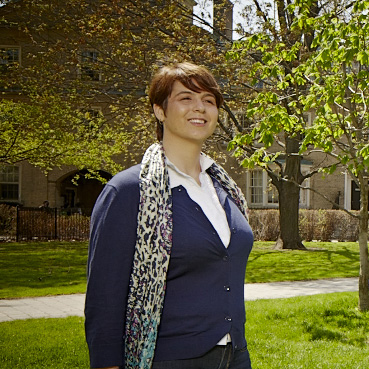Sarah Jane Steele

Sarah Jane Steele
Alumna, PhD (2015), Public Health Sciences
“There is an increasing emphasis and investment in global health.”
I came to the University of Toronto to complete a Master of Health Science degree in Community Health and Epidemiology — a practicum-based program. This offered me the opportunity to work in Yellowknife with the Government of the Northwest Territories and in The Gambia, West Africa with the UK Medical Research Council.
After completing my master’s degree, I spent a year at the University of Zambia on a NetCorps-funded internship. While in Zambia, I became interested in evidence-informed practice, which, combined with my desire to accrue more global health experience, drove me to apply to the PhD program in epidemiology in U of T’s School of Public Health. I am also a student in the Collaborative Doctoral Specialization in Global Health.
My dissertation work comes out of a Teasdale-Corti funded research and capacity-building collaboration between the University of Toronto and the Shanghai Centres for Disease Control and Prevention. The larger project involved several research studies focusing on the lives and sexual behaviours of populations vulnerable to HIV — migrant construction workers, people living with HIV, female entertainment workers, men who have sex with men (MSM) — and one component which reviewed policy relevant to HIV in China. I worked specifically on the MSM component.
I applied to the PhD program in epidemiology when I was still working in Zambia, with the intention of leveraging existing connections between U of T and the University of Zambia to return and conduct my doctoral research in Zambia. But the path to a PhD is often not linear. Ultimately, I did not return to Zambia, but I continue to communicate with Zambian colleagues and have been involved in various activities relevant to ongoing projects there.
The epidemiology program requires core courses and a standardized comprehensive exam. This provided me with a strong foundation in classic epidemiology. As a result, I often utilize methods designed specifically for accessing hard-to-reach and vulnerable populations. I feel that the combination of core coursework, comprehensive exam, and applied learning through my dissertation have given me a depth of knowledge and skills not offered in PhD programs that lack coursework.
The University of Toronto is internationally recognized. There is an increasing emphasis and investment in global health. During my PhD, I have been fortunate to conduct research in Canada, China, Kenya, and South Africa. I have interacted with faculty and researchers from U of T and other universities in Canada and globally through organizations such as the CIHR Social Research Centre in HIV Prevention.
It can be daunting to start a PhD program but it is a great opportunity to take the time and space to learn for the sake of learning. There can be a lot of stresses in the life of a PhD student, but there is something special about the process. As a classically trained epidemiologist, having a majority representation of sociologists on my thesis committee has pushed my boundaries. I don’t know what other setting would allow me this freedom of critical thought.
